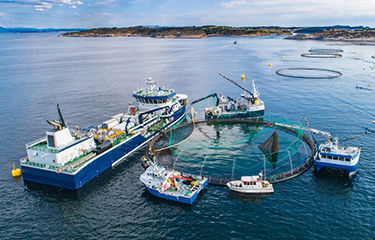Salmon industry stays quiet as Norway reveals tax-proposal details

The Norwegian government has finally revealed the details of its salmon tax proposal, and Norwegian salmon farming companies are staying relatively quiet about it.
The government’s proposal includes a 5 percent reduction in its aquaculture resource rent tax, together with a higher pre-tax threshold for company profitability. Details of the Norwegian government’s long-awaited proposal were published on 28 March, 2023, some six months after it was first proposed. Under the plan, which would need to be approved by parliament, fish farming conducted in coastal waters will be subject to a tax rate of 35 percent, effective 1 January, 2023, below the 40 percent rate that appeared in its consultation proposal.
According to the government, the revised proposal’s standard tax on profits above NOK 70 million (USD 6.7million, EUR 6.2 million) will mean only companies with “significant profits” will pay the resource rent tax. The standard deduction outlined in the original consultation memorandum was either NOK 54 million (USD 5.2 million, EUR 4.8 million) or NOK 67.5 million (USD 6.5 million, EUR 6 million).
In a brief statement issed through the Oslo Børs, Mowi said aside from the reduced resource rent tax from 40 percent to 35 percent, the plan was “not very different to the original proposal.”
In a separate filing, SalMar said the proposal needs to be approved by the Norwegian parliament, and that it expects final clarification before summer.
“SalMar submitted a detailed response to the public consultation process clearly and strongly opposing the proposed tax. The basis for the tax proposal assumes the salmon industry generates excessive returns compared to the risk involved, but this is not accurate. And SalMar strongly emphasized that the proposal should be permanently set aside,” it said.
Grieg Seafood said parliament is expected to discuss the proposal and enact the law before July 2023, and that as such, parliament may still make changes to it.
“When the law has been enacted by the parliament, Grieg Seafood will assess how the tax will impact the group's strategy and investments,” it said.
Norway’s government advised that initially, taxable revenues will be based on the market value when fish are removed from the pen, which the companies will set themselves for 2023. But starting in 2024, the government wants to have an independent price board in place. It confirmed that it moved away from the original proposal of using a norm price based on Nasdaq prices.
It said an advantage of the tax proposal is that it automatically adapts to profits in the industry. The objective, it said, is not to collect a specific amount in tax revenues, but rather gather a share of the value created. Consequently, there will be larger tax revenues in years with higher sales prices and high resource rents, but that tax revenues will be low during years of low resource rents.
Half of the revenues accrued from the tax will be awarded to the municipal sector, with areas hosting fish-farming activities receiving greater shares. According to the government, this will be achieved through a significant increase in the production tax – up to NOK 0.90 (USD 0.08, EUR 0.09) per kilogram, and by increasing the municipal sector’s share of auction revenues from 40 to 55 percent.
Norway Prime Minister Jonas Gahr Støre said there is a long tradition in Norway in which value that’s created from using common natural resources is dedicated to benefit society as a whole.
“Access to our common natural resources has enabled this industry to generate particularly high earnings. All of us should be able to derive greater benefit from the significant value that is created. It is now the time to introduce a resource rent tax for the aquaculture industry,” Støre said. “The aquaculture industry is one of Norway’s largest and most-profitable industries. The average returns generated in this sector during the last decade have been three to four times higher than in manufacturing. A larger share of this should accrue to society as a whole, while at the same time we also support the industry continuing to develop and create jobs and value along our coast into the future.”
Støre said while the basic model from the initial consultation proposal was not significantly altered, the government listened to all 420 response submissions.
“We have placed particular emphasis on the arrangement ensuring continued growth, while a share of the resource rent from the aquaculture industry will also accrue to the society as a whole,” he said.
Previously, a resource rent tax was placed on Norway’s petroleum sector, and this played “an essential role” in building up the country's pension fund, according to Norway Finance Minister Trygve Slagsvold Vedum.
“We are continuing this tradition by also introducing a resource rent tax on aquaculture, which will make it possible to create employment and generate earnings, while local communities and society as a whole are also able to receive a share of this value by making coastal areas available to the industry,” Vedum said. “Our goal is that those who make the fjords available to fish farmers, will derive greater benefit than what they do under the present arrangement.”
Norwegian companies have countered the government’s argument regarding aquaculture’s use of natural resources – saying that it is starkly different from petroleum production.
“The proposal does not take into account that aquaculture operators do not deplete natural resources (such as oil and gas) and that they also do not harvest natural resources (such as hydropower, wind power, fisheries, and forestry),” Cermaq said in its arguments against the tax proposal. “Aquaculture operators put their own smolt into the sea, feed it to adult size, and take it out of the sea again before processing it into a saleable food product.”
Norway isn’t the only salmon-producing nation looking to increase its industry tax. Earlier this month, the recently-elected Faroese government announced a ...
Photo courtesy of Marius Dobilas/Shutterstock





Share